Article's Content
Reviewing a brands products, an authors new book or a makers software is a form of content that has stood the test of time.
At the beginning of the 18th century, an Englishman by the name of Jonathan Richardson built a reputation for art critique. From 1969 to 1999, the American duo of Siskel and Ebert were movie critiques that could sink a movie with two thumbs down. Today, review sites have a similar power when it comes to software, books, movies, businesses, destinations and more.
The societal influence and power that comes with critique is deep inside of human behavior. In many ways, it dates back decades before any of us…
In 1961, the book “Stranger In a Strange Land” was published and the protagonist is writing a poem for a local publication. When the protagonists assistant tells them the scansion (the rhythm of a line of verse) is off they respond:
That’s so the editor can change it. You see, after an editor pees on a submitted work, they like the flavor better and are more likely to go with it.
Funny enough. There’s some truth in that…
In today’s market; there are two types of critics:
(1) The critic who reviews products, businesses, books and movies for the greater good.
We all love them. These are the Aunts and Uncles who want to let everyone know how great that restaurant was or about their soggy french fries.
And then there’s (2) the critic with the sole intent of generating traffic from the internet and capturing revenue in some way for their business.
These are the websites, bloggers and YouTubers who are also appreciated while also being rewarded through capital.
In this essay, I’m going to dive into the power of online reviews today, the demand for this type of content and how smart companies like Zapier have an SEO Moat using reviews as value arbitrage.
Let’s get to it…
The Business Model For Sites With Reviews
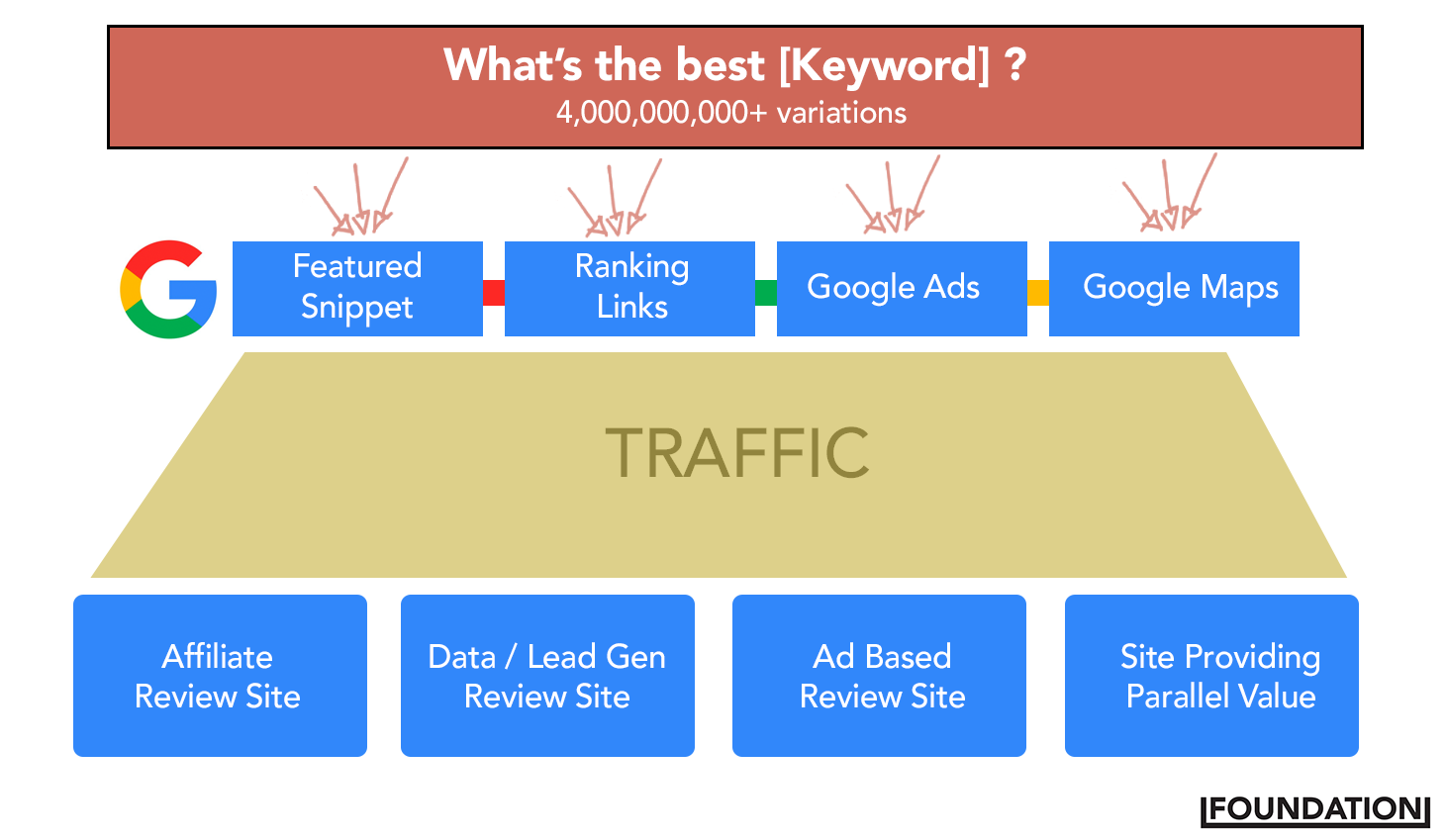
Every day thousands of people go to Google looking for “the best hat”, “the best journal app”, “the best frozen pizza”, “the best CRM tool“, “the best iphone case” or some other variation of a search related to finding a third party critique and review. These searchers are then met with a wide range of different types of content in the SERP (Search Engine Results Page) like ads, featured snippets and maps:

Brands compete for this space in the SERP knowing that it can result in great returns. The business model of providing reviews to searchers has created a handful of billion dollar companies and a handful of up and coming startups looking to create their own empire on the back of search.
There are four key ways that a website creating reviews can benefit:
Affiliate Marketing

We see this with sites like Wirecutter from the NY Times.
The authors will purchase 20 different pillows, try them all and write in-depth reviews about each. The top pillow will be highlighted and include an affiliate link driving people to Amazon or another partner whom they have an affiliate deal with.
One of the top players for providing the affiliate ecosystem with an opportunity to exist is Amazon. According to Affiliate Insights, in a study of 1,000 Amazon affiliate sites 4.4% of them were generating over $100,000 per month in revenue. Demonstrating the value to be had in this lane:
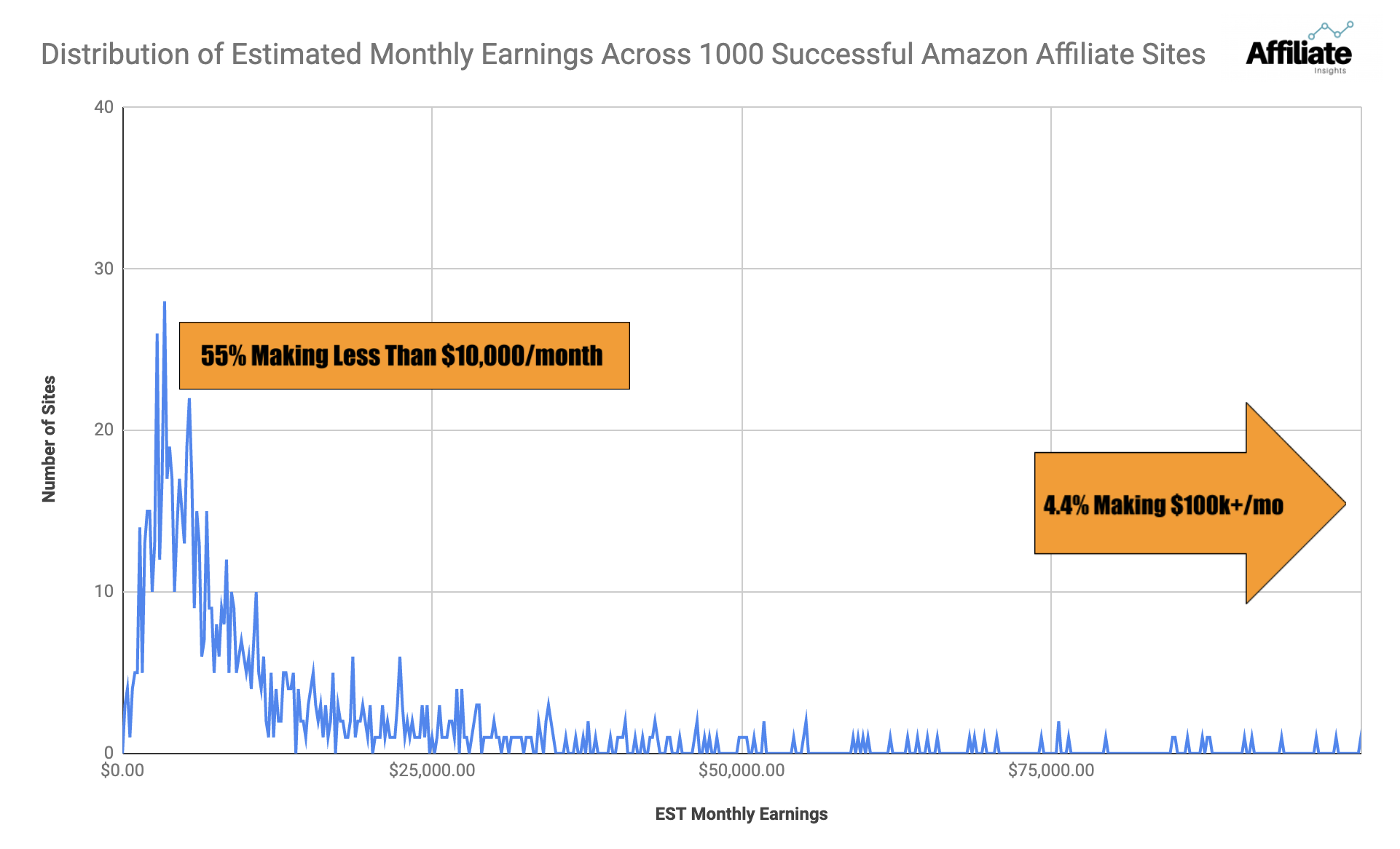
Selling Leads / Data
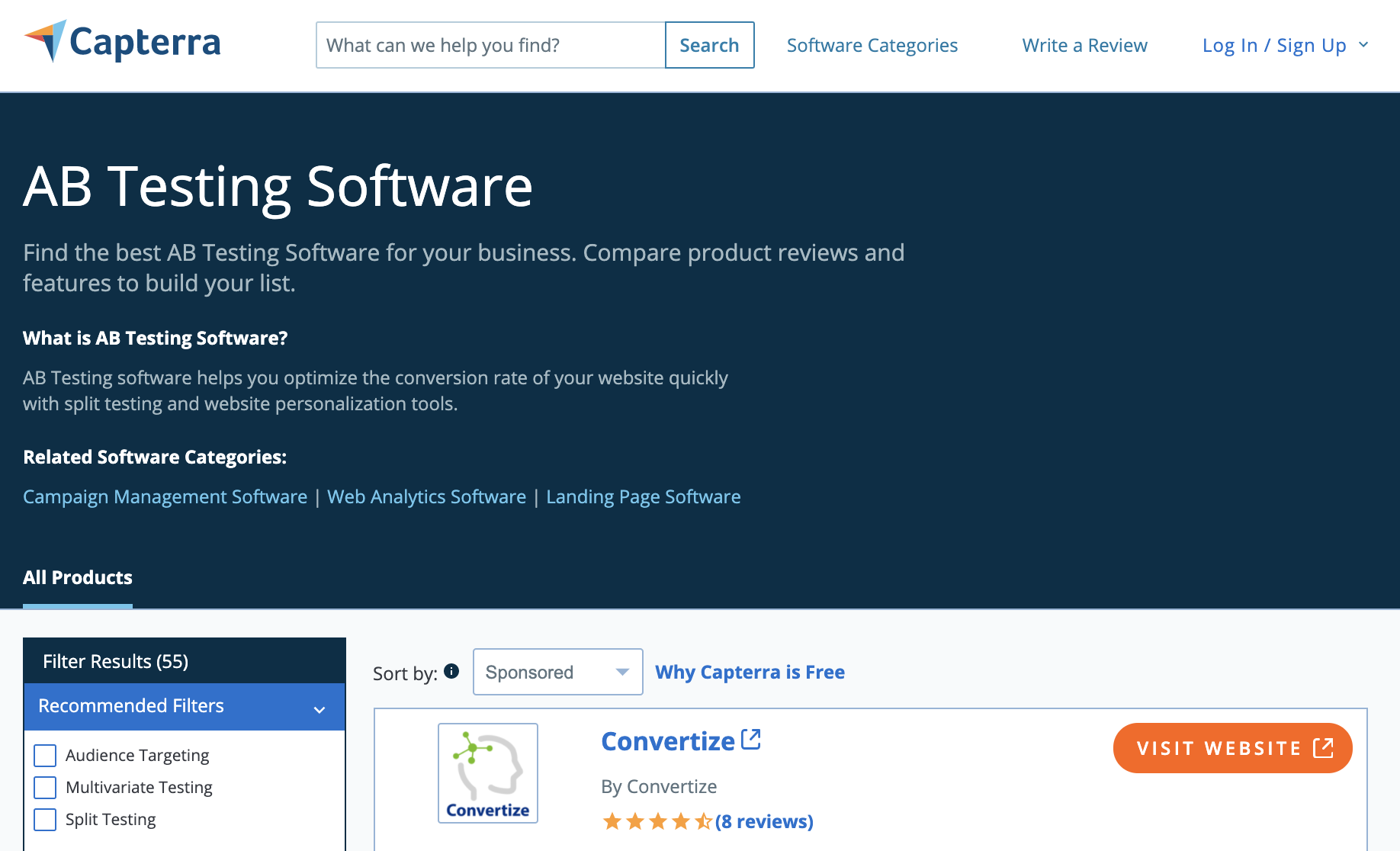
Sites like Capterra, G2 and TrustRadius all provide data to their customers in some form. Whether it’s actual inquiry data (ie. contact names, emails, etc) or general metrics around activity and engagement — they all provide data to help organizations better understand their customers and target buyers.
On-Site Advertising

These sites are typically smaller and generating anywhere from tens of thousands to hundreds of thousands of visits a month. In addition to showcasing a variety of services or products that are reviewed – they also have ad space available.
Sites Providing Parallel Value
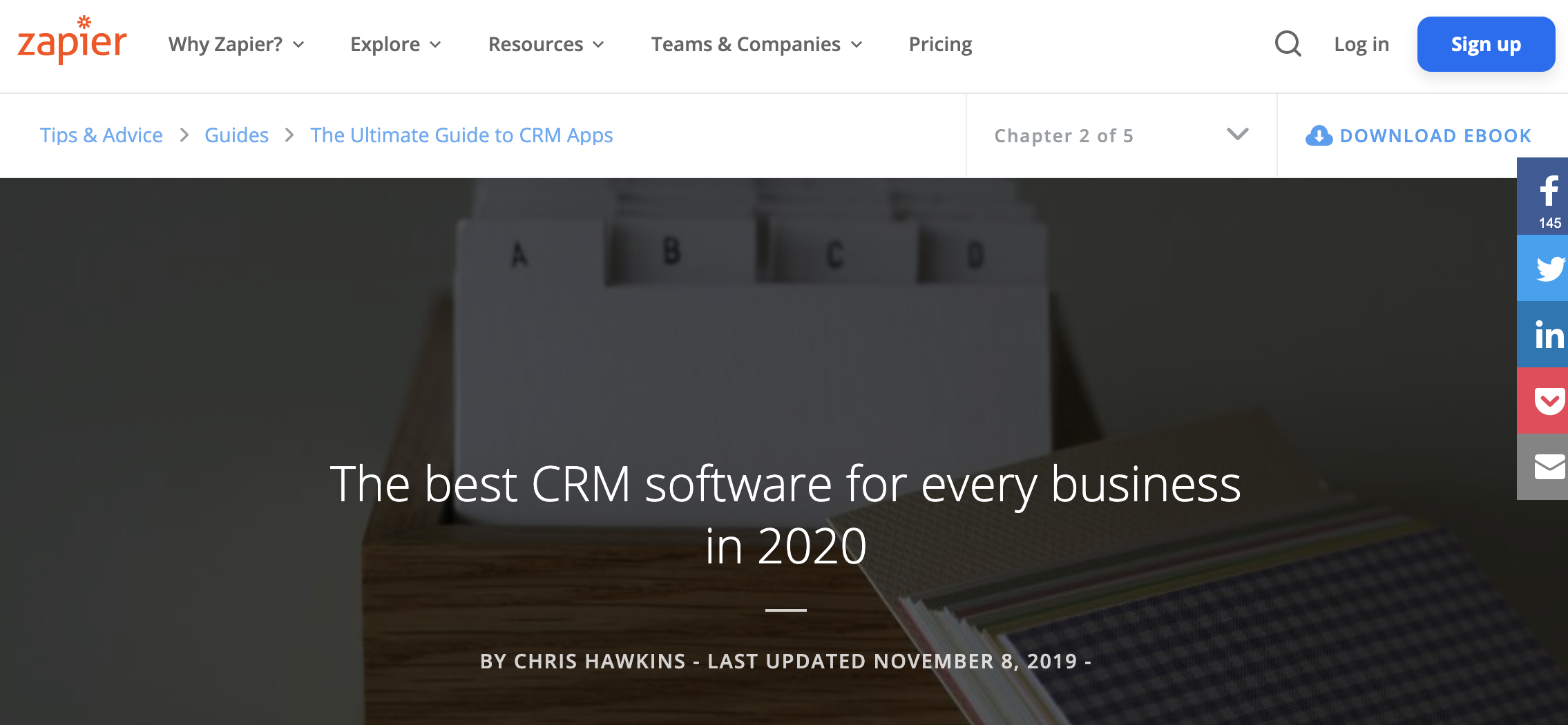
A lesser known strategy but one that we’re going to talk about primarily in this essay is the use of reviews to generate traffic and sell a secondary product. It’s only feasible to leverage this strategy when the product or service you’re offering has parallel value to the searchers query for reviews.
Bloggers have done this for years to attract top of the funnel visitors and some software companies are starting to catch on. An ecommerce store selling coffee grinds could find value in ranking for the phrase “best coffee press” or an accountant could find value in ranking for “the best accounting books”. Upon attracting these visitors, the sites would need to show their value proposition to the readers to convert.
The Blended Model
In most of the examples above, you’re going to actually find that these companies embrace multiple revenue models.
TripAdvisor doesn’t just offer data to businesses who claim their profile. They also offer a wide mix of advertising offerings in the form of behavioural targeting, destination targeting, homepage targeting, sponsored newsletter ads and more. If you’re a software company looking to be at the top of a Capterra category listing you have to pay to have a meaningful presence on the default “Sort by Sponsored” listing page.
How Many People Are Looking For Reviews?
A lot…
More than 3.4 billion people will visit a review site (or page dedicated to reviews) in 2020:
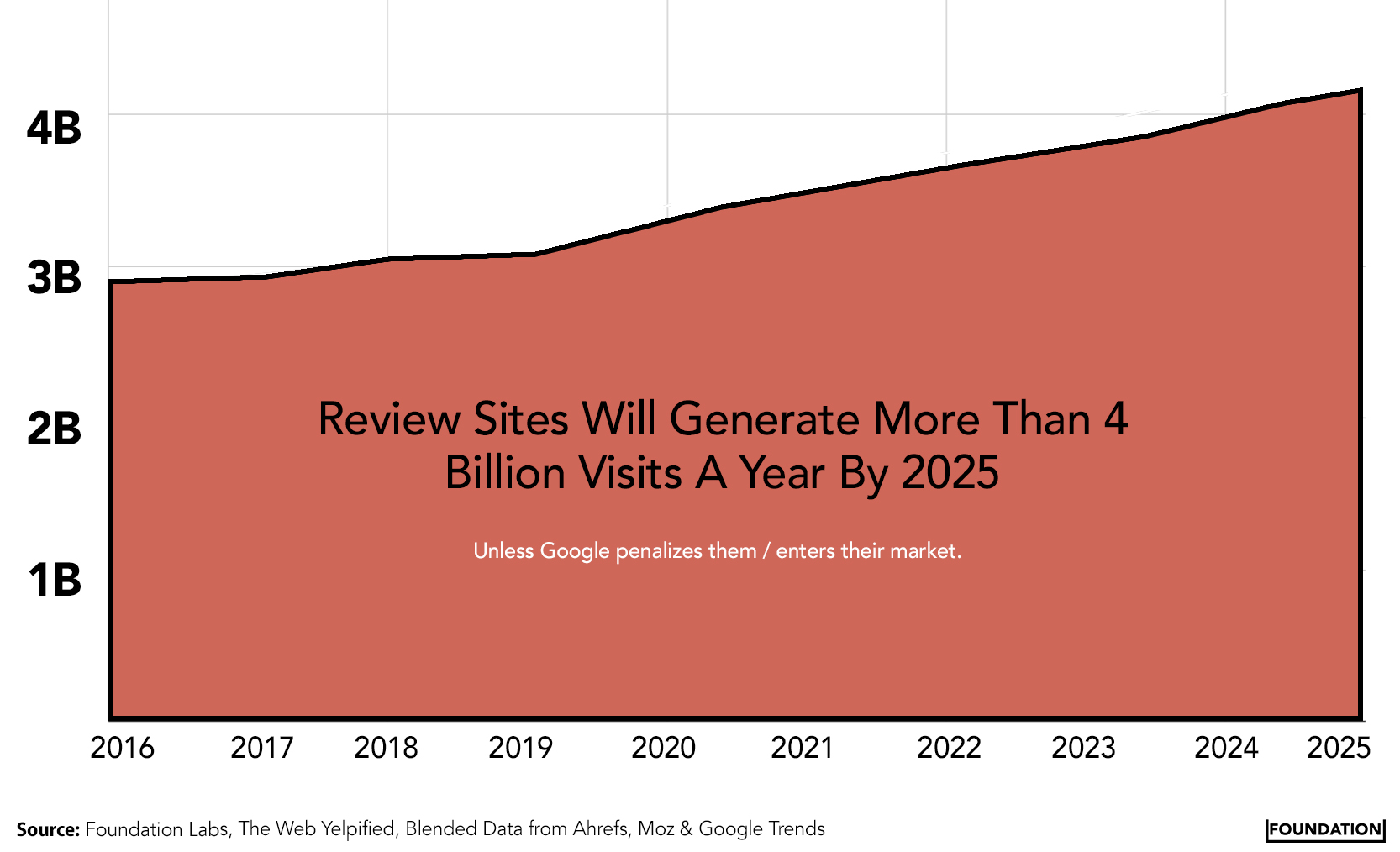
When I say a lot, I mean a lot more….
I mean a lot more. The chart above is based on just 13 of the most popular review sites from both a B2C and B2B lens. There are far more review sites than these but the volume above represents existing and project organic traffic from the following sites: 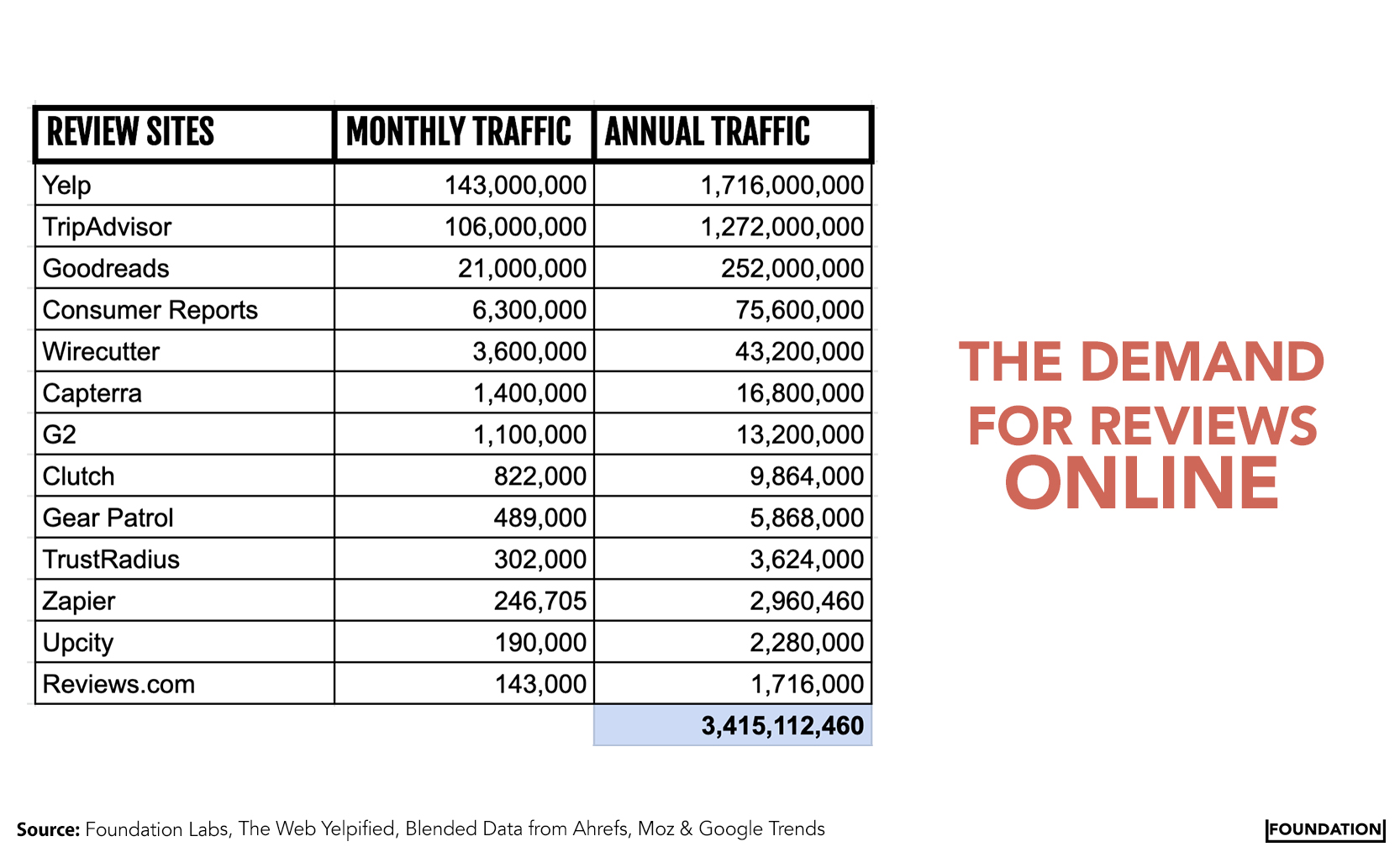
You may not have caught it but one of these sites is not like the other…
Did you happen to notice that amidst the G2s, Capterras, Wirecutters and Yelps there was a business that doesn’t rely SOLELY on reviews as their business model?
That company is Zapier.
How Zapier Is Using This Strategy To Win
Amidst all of these review sites and review companies, Zapier is generating nearly 3M annual visits to a collection of landing page that are built to rank for keywords related to reviews. But Zapier isn’t a review company — it’s a tool that allows your customers to connect apps they use every day to automate tasks and save time.
Yet, they’re ranking in Google for phrases like these:
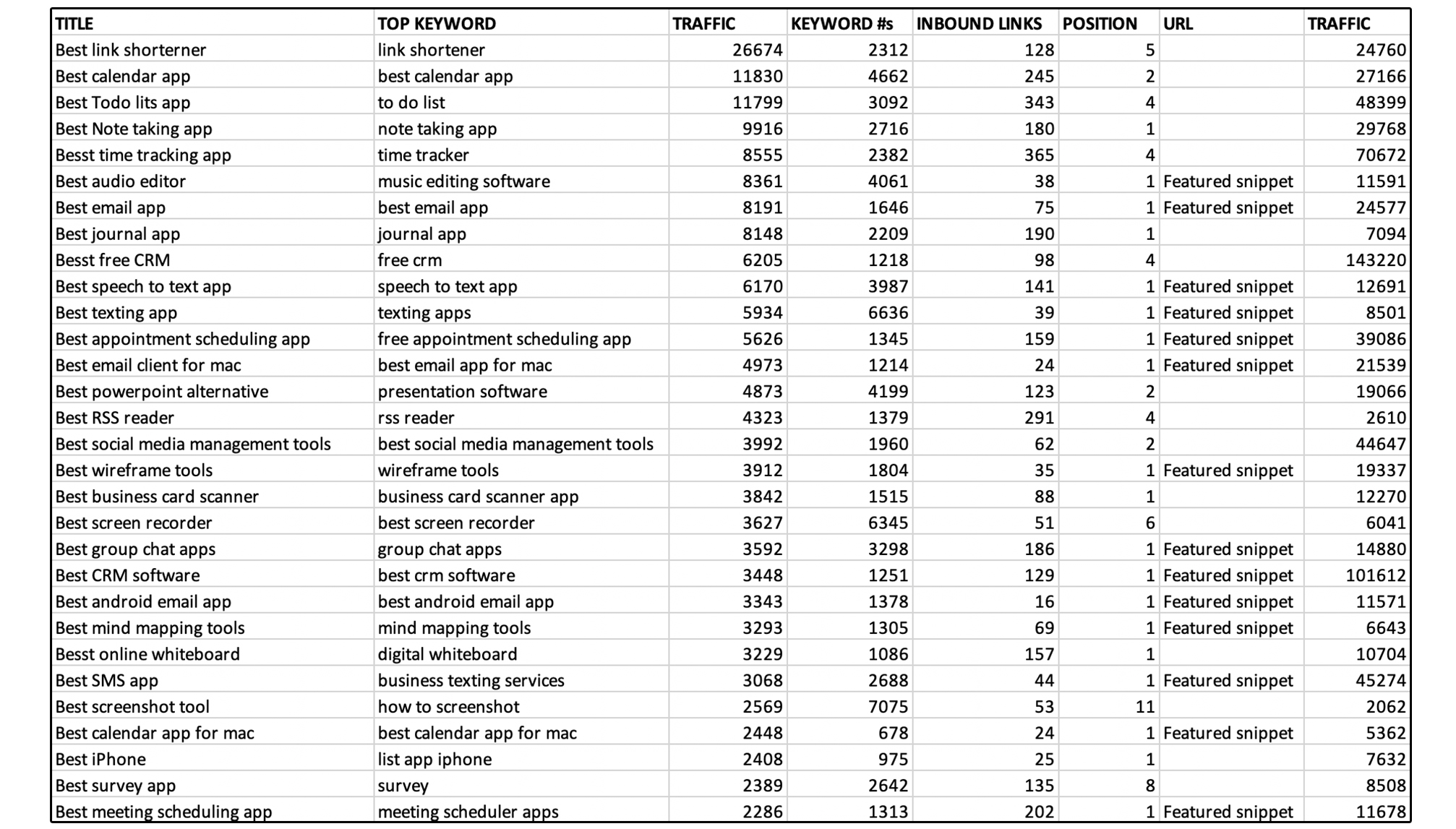
Whether you’re looking for the best calendar app or the best free CRM – Zapier is there in the SERP providing you with a review. Zapier has more than 40 different blog posts dedicated to providing searchers with a list of the best software across multiple industries. Zapier is able to capture value from the visits to these pages because many of them have integration within the Zapier ecosystem.
For example, in their “best spreadsheet” blog post they finish each recommended section with a call to action showcasing their integrations with the product:

This is an example of parallel value extraction through SEO.
Parallel value extraction is the fulfillment of a demand that is parallel to your value proposition while extracting value by showing value alignment.
In other words, you create an asset (blog post about the best spreadsheet apps) that fulfils that demand (high search volume) while aligning your value proposition (spreadsheet integrations) in the asset your audience originally (excel alternatives) sought out to find. This strategy is resulting in an SEO Moat for Zapier that could last for years to come.
For many of these phrases, Zapier owns the featured snippet:
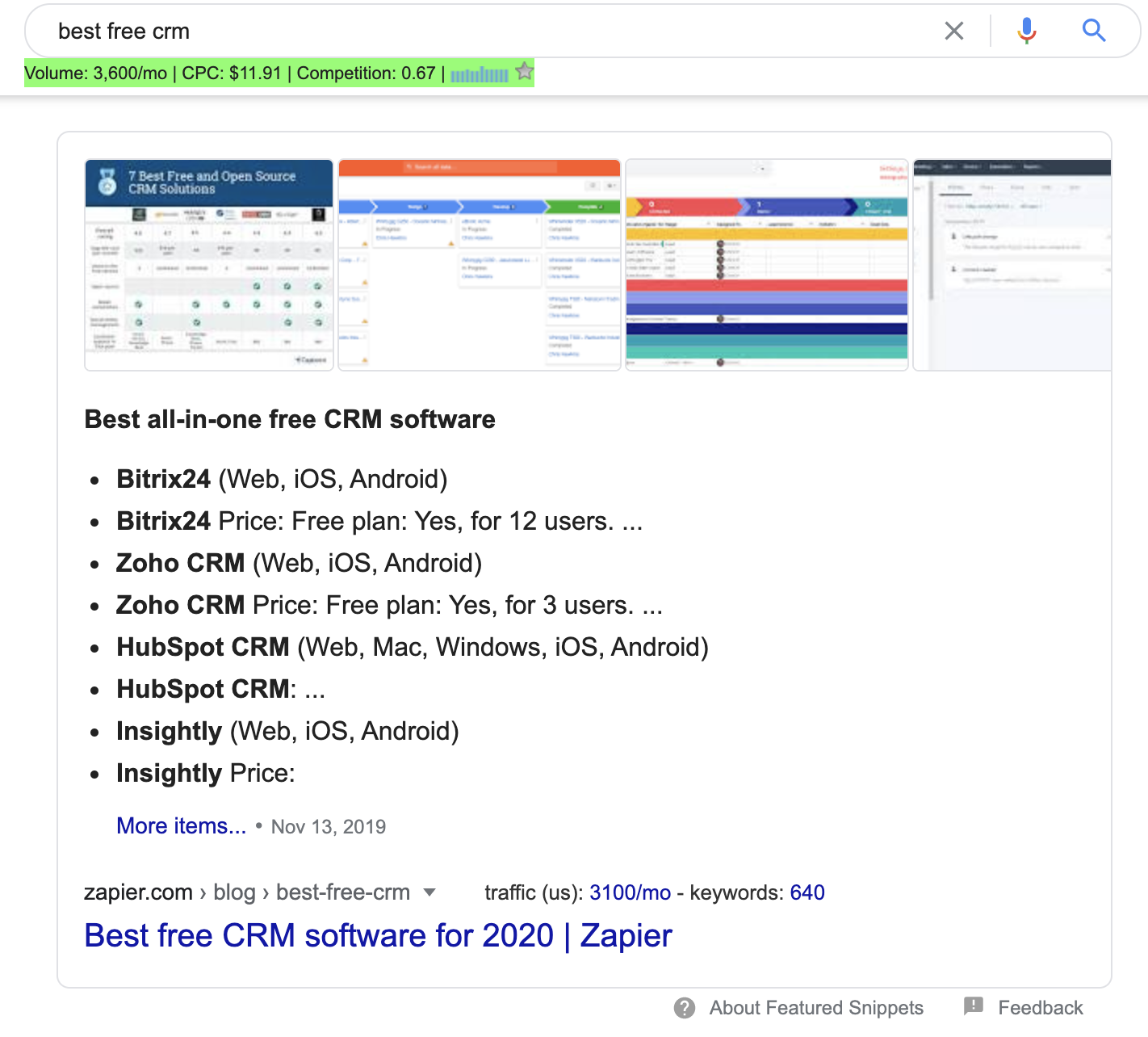
The SERP dominance is real…
And unlike SERP competitors like Capterra, G2 or Trustradius (all sites chasing keywords like “Best CRM”); Zapier benefits from being a site with no dog in the fight regarding who ranks where in this article. Traditional review sites have factors like sponsorship, popularity, UGC, market size and more that determine who ranks where. On Zapier (or any other site embracing this strategy) the rankings come across more authentic and unbiased as they’re pure opinion based.
The strategy has worked to perfection for them as they’re able to capture this traffic and show readers their value proposition at the same time.
Keep in mind:
While this has worked well for Zapier; it doesn’t mean it will work well for everyone. The key that they’ve uncovered is the importance of having a parallel value proposition to all of the various “best [software keywords]” people are looking for. That’s the key.
You should also keep in mind that the entire “Review” strategy does come with risk. That risk is connected directly to Google’s decision to create or launch a product that competes with your review site or adjust their algorithm to favor a different type of site vs your own.
Remember:
With great opportunity comes great risk.
The folks at Reviews.com learned this the hard way.
Take a look at their estimated organic traffic between 2019 and 2020:
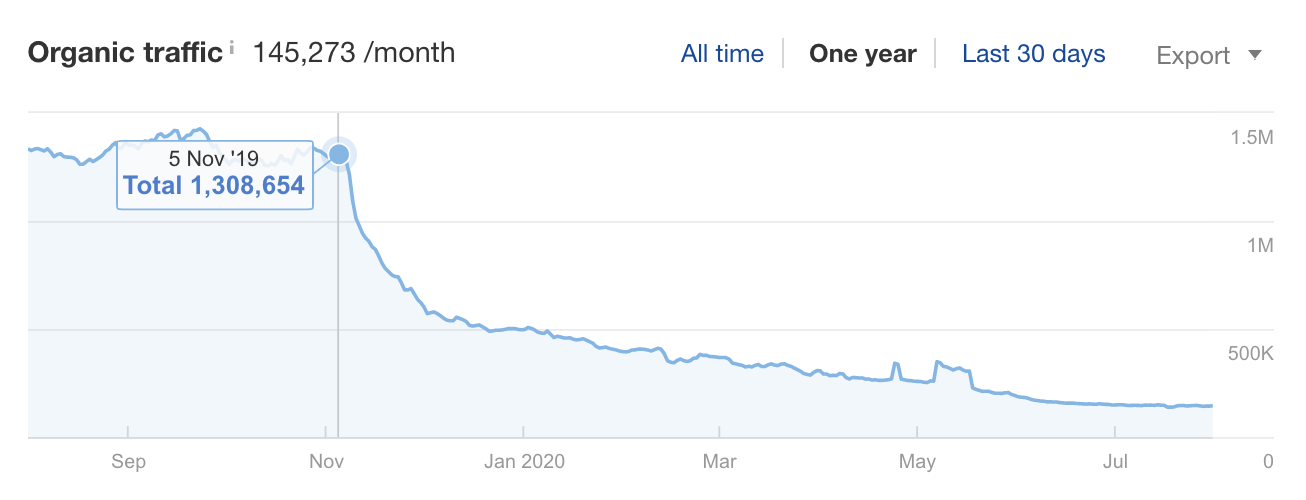
The site went from generating 1.3M monthly visits to 145,000.
That’s enough of a dip to wipe a business out entirely.
So while providing critique and reviews can present an SEO opportunity…
It’s becoming increasingly clear that this model is not exactly bullet proof. There’s no question that there’s revenue and organic traffic still to be had in leveraging this model. There’s no question that there’s opportunity to rank for some highly competitive phrases still today. And there’s no question that using reviews can be a great way to strengthen your SEO moat when you have something else to sell.
But be careful of placing all your eggs in the critique bucket.
I’ll leave you with this quote from Theodore Roosevelt:
It is not the critic who counts; not the man who points out how the strong man stumbles, or where the doer of deeds could have done them better. The credit belongs to the man who is actually in the arena, whose face is marred by dust and sweat and blood; who strives valiantly; who errs, who comes short again and again, because there is no effort without error and shortcoming; but who does actually strive to do the deeds; who knows great enthusiasms, the great devotions; who spends himself in a worthy cause; who at the best knows in the end the triumph of high achievement, and who at the worst, if he fails, at least fails while daring greatly, so that his place shall never be with those cold and timid souls who neither know victory nor defeat.
Stay safe.








